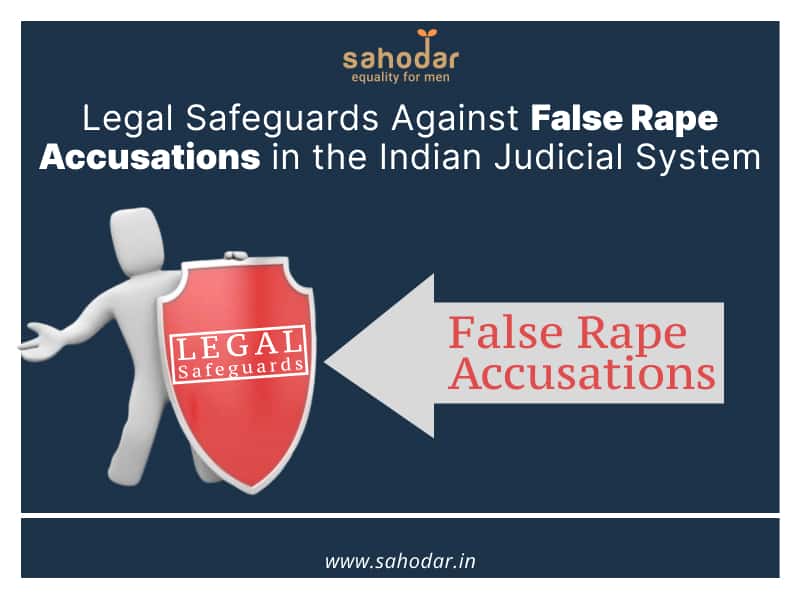Introduction
The Indian legal system, like many others globally, grapples with the complex and sensitive issue of false rape accusations. While genuine cases of sexual assault must be addressed with utmost seriousness, it is equally crucial to protect individuals from baseless charges that can have severe consequences. In this comprehensive discussion, we will delve into legal strategies and safeguards that men can employ when facing false rape allegations in Indian courts.
1. Evidentiary Documentation
One of the foundational aspects of building a solid defence against false rape accusations lies in meticulous evidentiary documentation. In today’s digital age, maintaining records of all forms of communication is paramount. Preserving text messages, emails, and social media interactions can serve as critical evidence to establish the nature of the relationship and consent between the parties involved. This documentation becomes a pivotal component in unravelling the intricacies of the case and proving the absence of coercion or non-consensual behaviour.
Furthermore, digital communication can shed light on the relationship’s dynamics, helping establish a context crucial in refuting false claims. Courts often consider electronic evidence a reliable source for verifying the integrity of events, making it imperative for individuals to adopt a proactive approach to preserving such records.
2. Emphasizing Consent
Promoting and ensuring explicit and affirmative consent is a cornerstone in navigating intimate relationships and safeguarding against false accusations. Establishing open communication about boundaries, desires, and expectations can create a foundation of trust and mutual understanding. It is essential to prioritise a culture of consent where both parties are comfortable and willing participants in any intimate activity.
In legal terms, the emphasis on consent becomes crucial. While verbal communication is valuable, obtaining written consent or using dedicated consent apps can add protection. These documented forms of consent serve as tangible evidence in establishing that the interactions were consensual and that both parties were on the same page regarding the nature of their relationship.
3. Surveillance Measures within Legal Boundaries
Surveillance cameras in private spaces, such as homes or hotel rooms, can be a contentious yet effective strategy to establish the truth in the event of a false accusation. However, it is essential to emphasise that surveillance measures must comply with legal standards and privacy regulations.
Installing cameras legally and ethically, respecting the privacy of all parties involved, can provide an objective record of events. The footage can serve as a credible source of evidence, corroborating the narrative presented by the accused. While acknowledging the sensitivity of this approach, its legality and adherence to privacy norms are paramount in ensuring the admissibility of such evidence in court.
4. Witness Testimonies and Alibis
In building a robust defence against false rape accusations, securing witness testimonies and establishing alibis can be instrumental. Witnesses, such as friends, family members, or colleagues, can provide crucial perspectives on the nature of the relationship and the events leading up to the accusation.
These individuals may be able to testify to the consensual nature of the interactions or provide an alibi, corroborating the accused’s version of events. Establishing a network of individuals who can vouch for the accused can significantly bolster the credibility of their defence. Courts often consider witness testimonies valuable, especially when they align with the accused’s narrative and contradict the allegations.
5. Timely Reporting and Official Records
A proactive approach to potential false accusations involves timely reporting to the authorities. Filing a preemptive complaint creates an official record of events, signaling the accused’s intent to address the situation responsibly. Timely reporting can also contribute to the preservation of evidence and may be viewed favorably by the legal system.
The official record serves as a foundation for the accused’s version of events, helping to establish a timeline and context for the interactions in question. While it may not prevent legal proceedings, an early and official report can shape the narrative and provide a structured account of the events from the accused’s perspective.
6. Legal Representation
Engaging legal representation is pivotal when facing false rape accusations. Consulting with a competent lawyer who specialises in sexual assault cases provides the accused with the necessary expertise to navigate the complexities of the legal system.
A skilled attorney can guide the accused through the legal process, ensuring that their rights are protected and that they present a robust defence. Legal representation becomes particularly crucial during court proceedings, where the nuances of the law, evidentiary standards, and procedural intricacies must be effectively navigated to secure a fair outcome.
7. Preservation of Physical Evidence
Physical evidence plays a crucial role in any legal proceeding. In the context of false rape accusations, preserving relevant physical evidence is imperative. This may include clothing worn during the alleged incident, objects involved, or any items that could affect the case.
Seeking prompt medical attention and securing medical reports that support the accused’s version of events can be critical. Physical evidence adds a tangible dimension to the defence, providing concrete elements that can be presented in court to counter the allegations effectively.
Conclusion
In conclusion, navigating false rape accusations in the Indian judicial system requires a multifaceted and proactive approach. Adopting legal safeguards, such as meticulous documentation, emphasis on consent, lawful surveillance measures, witness testimonies, timely reporting, legal representation, and preservation of physical evidence, can collectively contribute to a robust defence.
Moreover, society must foster a balanced perspective, recognising the importance of addressing genuine cases of sexual assault while ensuring fair treatment for those wrongly accused. As the legal landscape evolves, a commitment to due process, protection of individual rights, and the pursuit of justice remains paramount in mitigating the impact of false rape accusations on the lives of individuals.

